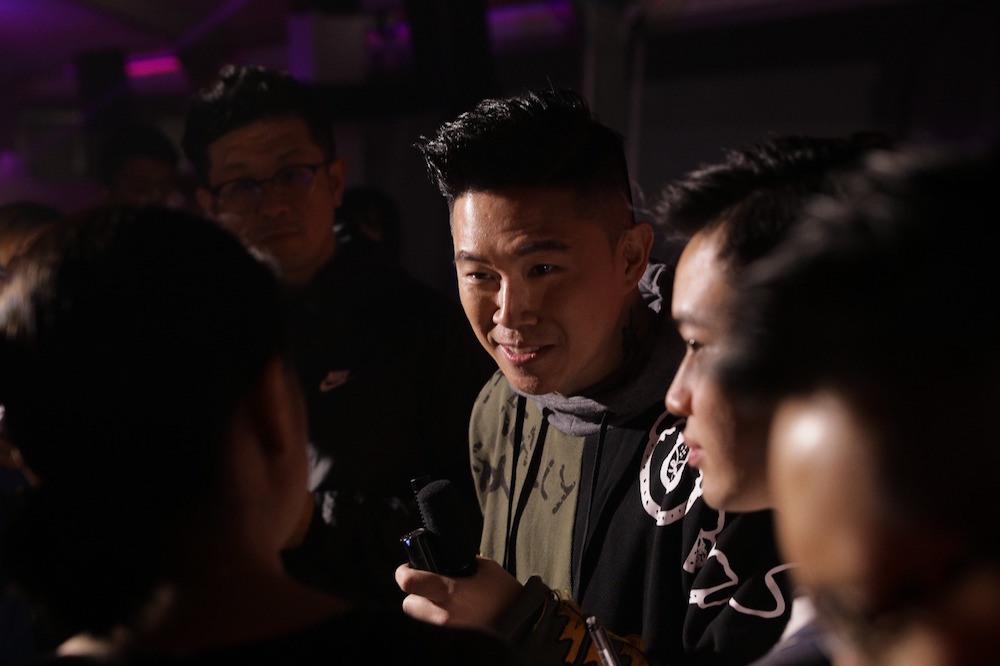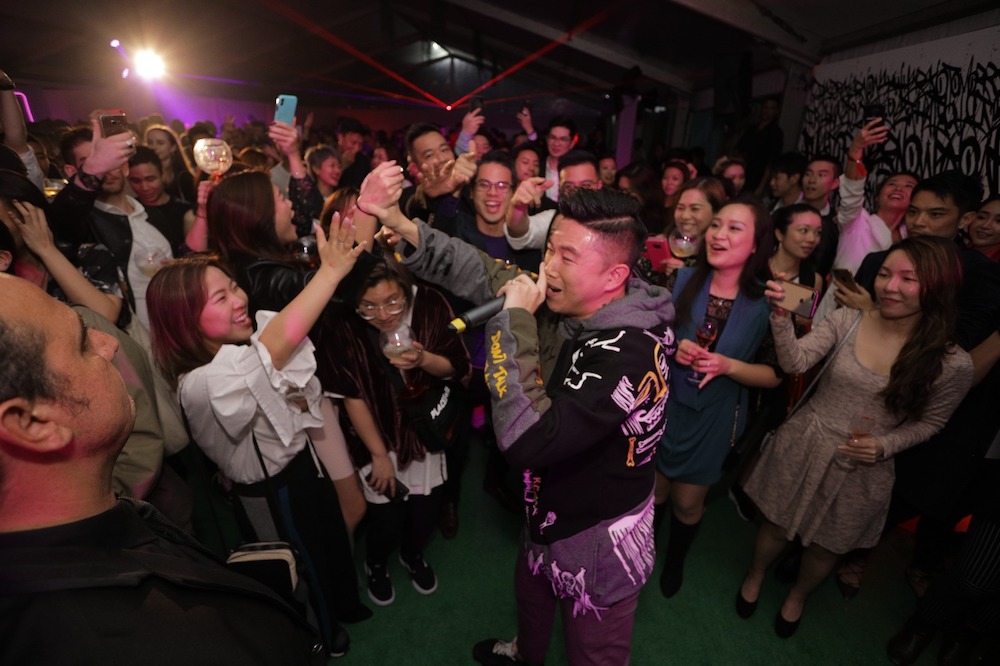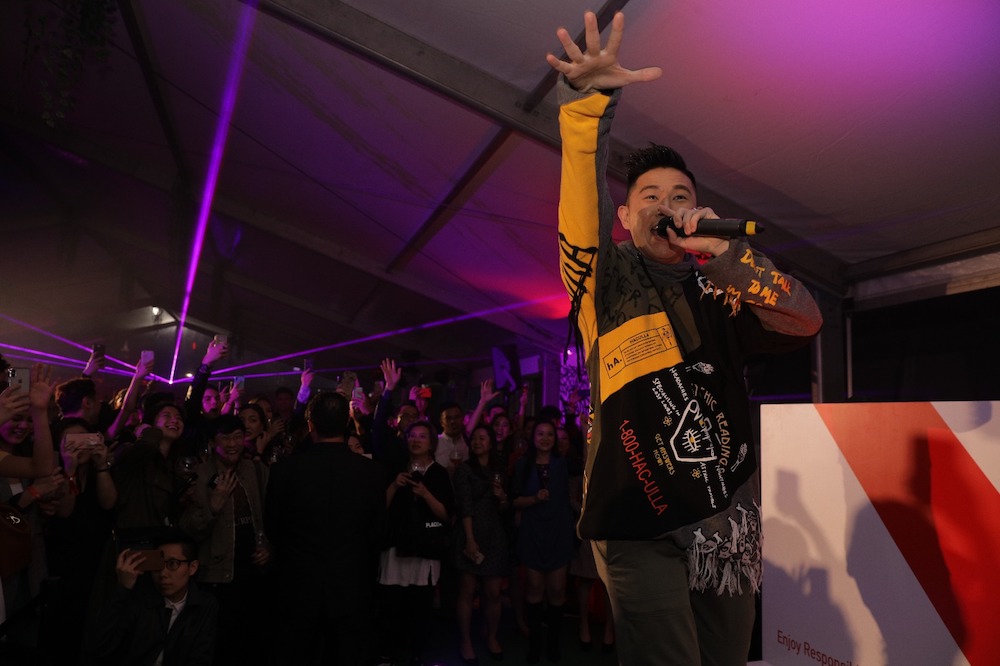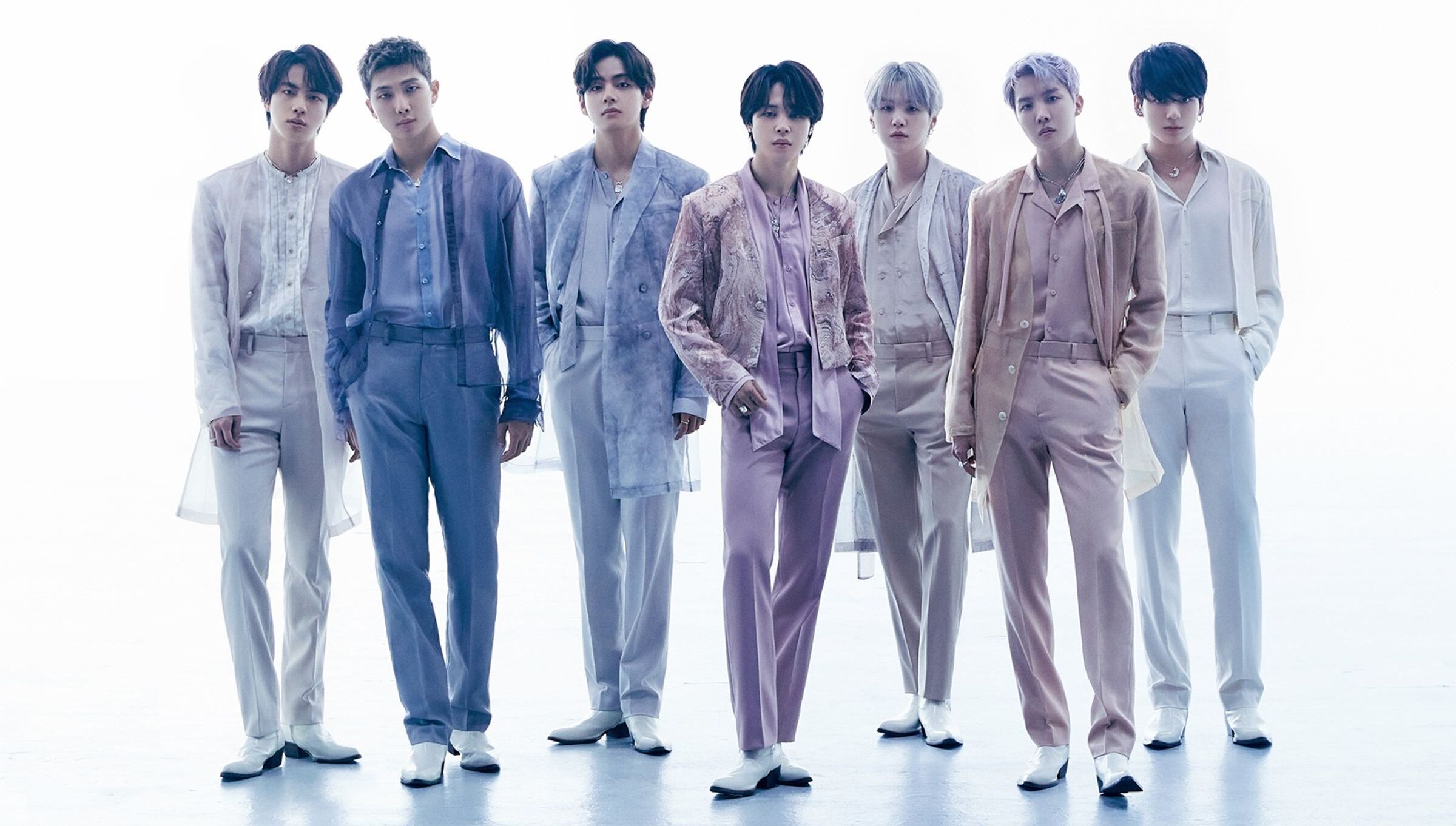
While MC Jin, (Jin, Hip-Hop Man or Jin Au-Yeung, depending on who you ask) went on to build success in a variety of settings, from joining Ruff Ryders, to later becoming famous in Hong Kong and now China, it was a moment over 15 years ago on BET’s Freestyle Fridays that I will always remember Jin for (there was no ‘MC’ back then). Stepping up on stage, in his baggy orange Enyce outfit, and clean-shaven head, he went on not only to beat, but dismantle his competition. Week after week, it was the same. An unknown, bald Chinese kid kept appearing on a black television channel proving that hip hop was not bound by race.
After 15 years, many changes, a family, finding faith and lots of hustling, Jin is still here spitting fire. He’s genuinely humble though—there’s no celebrity babying for him; when I asked him where he had dinner, I expected one of the city’s famous restaurants. His answer? “A Subway melt with turkey and bacon—but you know with all the extras”. It’s this humbleness, practicality and grit that resonated throughout the interview and really, throughout his career. So now over a decade later, I finally get to sit down talk to MC Jin about where he is now, where he was, and where he is going.
Who’s your hero?
My father.
How about a legend in your life?
Jeremy Lin. He’s a legend, and a hero, I put him in both categories. And I’m fortunate to say he’s a legend, hero and a friend.
Since Freestyle Fridays, what’s the biggest thing you’ve learned?
Nothing matters besides family.
You were able to break through an American rap and hip-hop scene with few Asian faces, how hard was that?
I think at the end of the day, it’s really about one thing, passion. Stuff like being Asian and breaking through, all of that is a worthy topic, but at the core, it’s about passion. For me, my journey wasn’t easy at all. Before and after. Let’s use Freestyle Fridays as an example—before it, it was tough, after it, it was tough. It’s still tough now. Of course, as time goes by, even if it’s little by little, there’s progress.

How do you feel about these new Asian rappers like Rich Chigga?
You mentioned Rich Chigga. Hopefully with this generation—the kids that are younger now—hopefully their minds are a little more evolved from previous generations, [but really] It’s just about one thing, skills and vibes.
It’s a lot of factors though, like the music industry—it’s like one universe of its own and there’s a lot of things inside it. They’re the gatekeepers who controls the companies, the radio stations, mass media—
Who controls who gets famous.
Bingo—who controls this interview, even. It’s so many little details and systemic things that exist. It’s cool though, as time goes on some of those systemic things, little by little do get shattered, especially now with this generation of young artists. The coolest thing is that now more than ever is that you can have a huge following and not be on TV or radio at all.
You once said, “Yo, Jin, this could be the last interview you ever do, so be honest, be authentic, be grateful, be sincere.” Does this still run through your head?
Upon first hearing that it can sound like something that’s gloomy and pessimistic, but it’s not. To me, that type of mentality is the equivalent of being grateful and having gratitude and maximising on every opportunity whether it’s one song, or six songs, or a whole concert.
Just being humble.
Well, being humble is one thing. That’s an interesting thing, humility. It’s not just me just going like ‘yeah man, I like to keep it humble’, that means absolute crap. True humility goes without saying. People see it in you before you even get to say, ‘look at how humble I am’.
How’s rapping in China and rapping in Chinese?
It’s a new challenge and a new chapter for sure, a new experience. It’s real challenging primarily because I’m only scratching the surface of the language, whether it’s pronunciation, grammar or vocabulary. I’m really proud of my English vocabulary and I just always had a fascination and passion for learning more words. English-wise I’m proud of my vocab and constantly trying to expand it. Cantonese—I’m also pretty damn proud. But the mandarin is super, super new. Vocab-wise, grammar-wise pronunciation-wise, it’s a long process to master. As an MC, you have to have vocab. How dare you call yourself an MC if vocabulary is not something that you’re proud of.
Discover the influencers behind China’s rapidly growing hip-hop scene
Hip-hop is so new to China, and it doesn’t have the history that it does in the States. What do you think about this?
Here’s what I’ve learned. There’s a lot of history in hip hop and rap in China going back several decades to the 90’s. The only thing is, China is gigantic geographically and population-wise so it’s hard to say ‘this is the history of hip hop in China’ and package it neatly. But truth be told, back in the 90’s and early 2000’s there was already rap groups in China doing their thing—on multiple scales of course. If were talking on a commercial, mass level maybe not. But If you look like a guy like Jay Chou, you won’t think of him as an MC or like a hip-hop head. But truth be told music he’s been doing for years has hip hop elements in it. So, if you look at it at that scale as well, on a commercial, mass audience type of scale guys like [Chou] and Wang Leehom have put elements of hip-hop in.
How do you feel about Rap of China?
Without a doubt until this past summer, with rap of China I don’t think hip-hop has ever been presented to the masses in the way it was presented through that show. Yeah, it’s a program, it’s a competition, but it’s also an entertainment show. So of course, its packaged and edited and put together in a way that’s digestible for everybody, because that’s the point. You had everybody [in China] last summer, everybody going xi ha (hip hop in Putonghua), yo, yo, freestlye! Like everybody. I saw it firsthand.
How did traditionalists take it?
Of course, traditional hip hop heads noticed—of course they do—and they have varying reactions to it. Some were like, ‘This is dope, this is the first time we had this type of platform’ and you had some that were like, ‘Man, what’s this, this ain’t hip hop’. But beyond that collective of people, you had people who never had an ounce of interest in hop hop or appreciation for it start to see that oh, maybe this is pretty cool because it’s presented to them in a way that they can understand it. But we’ll see. I’m curious. Who knows what will happen in 5 years.
How have you changed since you were a young MC.
I’m in a specific chapter of my life where my approach and mindset can be summed up in one word: practicality. I’m just trying to be practical, whereas once upon a time there was a drive for stardom and recognition. I’m not saying those things don’t mean anything to me. But now, more than ever, my primary drive is practicality. When I say practicality, I mean yeah, I want to make money right now.
The main difference is before, my mindset was, ‘Yo I wanna make a lot of money’ because it was just like, ‘Yo I wanna make a lot of money So I can be a baller’. But now I want to make a lot of money so my family doesn’t have to worry about money. I don’t think that’s just hip hop, that’s every single person.
But money isn’t everything either. Money can’t buy you health, money can’t buy you happiness—it can’t. It can buy you moments, like, ‘Oh I’m gonna go shopping’, or ‘oh I’m gonna fly first class’. But if were talking real happiness, money can’t buy that. I want to do very well in my career to escalate and do well, but the drive is just different. The drive is how do I make life better for my parents, my wife, my son, my other kids that I hope to have one day.
Lastly, sometimes it seems like you’re caught between two worlds, do you ever feel like you’re not completely American and not completely Chinese?
Before I used to. Now it’s just a topic. I think only because for many seasons of my life I used to analyze and dwell on that a lot. I used to think, ‘I’m an outsider there and outsider here—what the hell’. But now it’s just like who cares. You know where I’m not an outsider? When I walk into my house and my wife sees me and my son sees me.
Check out MC Jin’s album XIV:LIX and keep an eye out for his future work in China and America.








